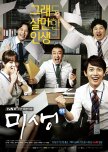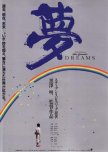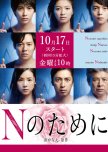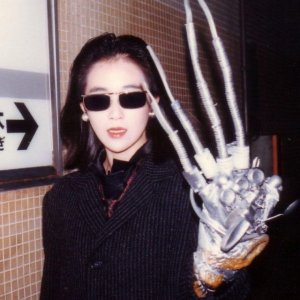
Holy crap. What a ride. By far one of the most well-written, well-acted, thoughtful, genuine dramas I’ve watched in a long time. ‘Misaeng’ (literary translated to “Incomplete Life”) which can also mean infinite potential, takes its characters on a journey of discovery, as they seek the paths that will lead each to find his or her own place in life and fulfillment. While 'Misaeng' depicts the most ordinary life of office workers, it doesn’t mean that only office workers can relate to it. It shows the viewers the meaning of one’s ‘life’, something that people often take for granted, not realizing that so many around the world are still searching for it. Also, that dreams can come true even when the odds are against you, that family/friendship is the strongest thing you have, and that forgiveness is what can hold you together. Although this drama is, at times, a tearjerker, in the end, you feel you have learned something. Based on these characters and what they’ve been through, you can set your heart and mind to something and accomplish it.
| STORY |
Based on a slice-of-life drama of a popular webtoon by Yoon Tae Ho. The story follows Jang Geu Rae (translated 'Yes' in Korean), a 26-year-old former Baduk genius who fails in becoming a professional player and gets thrown into the real world. By an acquaintance’s recommendation, Jang Geu-Rae is able to begin to work for the trading company One International as an intern. However, unlike other interns contending for full-time positions, Jang Geu Rae only has a GED certificate, no impressive work experience, no ability to speak foreign languages, and doesn't even know how to use a copy machine. But thanks to his hard efforts and unmatched perseverance he acquired from playing Baduk for more than 20 years, he lands a job as a 2-year contract worker. As the drama progresses, Geu Rae grows in confidence and strength of character; enough to stand up for what he believes in. But, in the end, what gives him the key to solving the problems in front of him were, paradoxically, insights that he learned from playing Baduk.
| ACTING/CAST |
To me, ‘Misaeng’ is more about characters development than it is about the story-line. With few exceptions, most characters are created with depth and dimension, and each has his or her own backstory. From Oh Sang Sik to Ahn Young Yi, Jang Baek Ki, Dong Shik and the relatively newbie Han Suk Yool, they each create a character that is so memorable and realistic you could see yourself in their shoes or know of someone who are like them. Even the support casts show a very effective performance and manage to bring humanity to otherwise cliché roles. Each had their own road to travel down, and sometimes the roads coincided with others, and sometimes they swerved away. But ultimately, the road of the office worker is an endless horizon of projects, presentations, and promotions. Some may end up taking that less traveled road, but still, the road continues on.
With a perfect ensemble cast, there are so many relationships and groupings that it’s impossible to talk about them all. So here, I’d just like to give my attention to some of my favorite relationships on the drama:
1) Oh Sang Sik/Jang Geu Rae
Oh Sang Sik and Geu Rae are absolutely and without a doubt the OTP of this drama. They pumped the show full of good feelings and when one was having a hard time, you could tell how much it affected the other that they did anything they could possibly do to stop the pain. Despite a bit of a rocky start, the relationship between Oh Sang Sik and Geu Rae grows and blossoms in spite of the odds, and it’s just heartwarmingly satisfying and endlessly gratifying, to see the affection they have for one another. As much as Oh Sang Sik helps and guides Geu Rae through the murky, unfamiliar waters of the corporate world, so does Geu Rae who provoke Oh Sang Sik to stay true to his principles and hold fast to his dreams. And I love that through it all, both Lee Sung Min and Im Siwan are so nuanced, that we can see the dynamic between Oh Sang Sik and Geu Rae growing and developing over the course of the drama, even when not very much is said at all. After all the struggles they’ve been through, it is gratifying to know that they found a place where they can be themselves, uphold their principles, and truly shine. I mean, a workplace with a motto of “We may lose work, but we don’t lose people”, with a boss as protective and supportive as Oh Sang Sik, where do I find thee?
2) The Newbies
All the interns (Jang Geu Rae, Han Suk Yool, Ahn Young Yi, and Jang Baek Ki) just grew into my heart, first individually and then as a group. With differing personalities and work boundaries, our newbies journey toke a long way before arriving at a genuine sort of group dynamic by series’ end. It was really nice, though, to see moments of solidarity and lending hands sprinkled through the show, among members of the group in their various permutations. I think they totally grew together believably where they were able to learn to respect each other and just be friends. Even the friendships within the friendship like (Baek Ki/Geu Rae, Seok Yool/Geu Rae, etc). Having said that, I did appreciate the care the series took in establishing the characters. There is the seemingly flawless female intern, Young Yi, whose exceptional ability as a woman incurs the resentment of her colleagues. Baek Ki a star intern, he was the image of the elite office worker and was my favorite among the newbies. Lastly, Han Suk Yool the fun intern who is a little too flattering to the higher-ups and a little too careless in about the boundaries of others, but he made the group feel alive. I loved his character to the core, because no matter how depressing and sad this drama can be in at moments, his character is right there to make you laugh and cheer you up. I learned a lot from these newbies that I concur with it being dubbed “The Salaryman’s Bible.”
| MUSIC/CINEMATOGRAPHY |
The soundtrack had a very relaxed type of vibe to it, that it made me feel for the situations, the people even though the environment itself is cold and depressing. It's not the typical high note, out of this world vocal with an intense orchestra playing in the background, but it's arguably the opposite. It's soothing, calm vocals accompanied with the acoustic piano and guitar. You can also get the comedy feel of the quirkiness of the background music as well. The music was one of the things that set this drama apart from others and also a factor into why I love this drama. I absolutely love all of Part 4 from the OST, since acoustic tunes just serenade with me so well. The only problem I have with the soundtrack is that since the plot is the main standout of the series, the music is faded into the background. I also really loved all the little touches that contributed to the aesthetic and feel of the drama – from the changing title cards showing the changing of the seasons, to the little wings of confidence (cameo by Choi Gwi Hwa), the use of imagery in these cases helped to depict the emotions amidst the storyline and engaged the audience even more. The drama certainly didn’t let me down with the cinematography with its carefully chosen muted color palette, understated plotting and thoughtful, deliberate pace, created a believable office world in which we, as an audience, clocked time as Geu Rae’ shadows.
Overall, 'Misaeng' is like watching the truth of any worker's life. It's a bunch of pieces of awkwardness, the hardest moments, the happy feeling when you have done your job, grumpy bosses, the difficulties that woman go through in the office due to marriage, childbirth, and sexual discrimination and harassment, and how staying true to life, their introspection and insights help us laugh at life and face the realities that are often escaped through all other forms of drama. 'Misaeng' shows many aspects of mundane life, but never itself, becomes mundane, taking the viewer on a beautifully poignant, vividly evocative and greatly inspiring journey from start to finish. Initially, it's true that the drama’s structure felt repetitive but in reality, our lives is a repetition as well. With great casting and different characters being protagonists at different instances of the drama, it will outweigh the feeling of repetitiveness. Above all, 'Misaeng' gives hope that relationships in office are not always simply work-related as 'work friends', it can also be bond together. To me, that's the true love-line in 'Misaeng'. It doesn't need to over-complicate the drama of the characters' lives, has no use for surprising betrayals; it actually lays most things out on the table for us. Why? Because 'Misaeng' wasn’t a drama, it was life. This drama is hands down the best drama I’ve seen and rightfully has earned a spot in my 'Forever Favorites' list. No other drama has spoken to me in such a real way. In the end, Misaeng certainly gave another small unexpected fragment to the missing pieces of my 'incomplete life'.
FINAL SCORE: 11/10. A big 'YES' from me! MISAENG is the 2014 drama and props to tvN for producing it and to the cast for the superb performances. I believe this is a drama that leaves a viewer of any demographic something to take away, I'd urge anyone reading this to give it a try.
Was this review helpful to you?

One of the most beautiful films I've ever had the pleasure to watch. Kurosawa is a master at building such a theatre inspired aesthetic with the focus primarily on his actors performance it comes to no real surprise that the performances throughout are terrific. Split into anthology of sorts the film at times struggles to maintain a coherent tone which it's audience may struggle to adapt with. The films only real issue is that it unfortunately steps into self indulgent territory with many scenes over extending their stay, resulting in bloated sequences throughout.
| STORY |
1. Sunshine Through The Rain
Magic. An incredible reminder that dreams had in childhood can have cruel and terrifying stakes that far exceed our external world. Stunning matte paintings, too.
2. The Peach Orchard
My mouth was hanging open watching this segment. A mix of pre-pubescent mystery, wonder, and frustration. Kurosawa is on the longest of lenses, compressing his action to a completely flat plane, like a tapestry – they’re so long you can actually see heat waves shimmering in the foreground. Worth watching for this segment, alone.
3. The Blizzard
Mountaineers slowing down, stuck, fallen, and visited by a snow ghost spirit. I feel like I've had a version of this dream at some point.
4. The Tunnel
The distant glowing light of the solider's 'home' packs more poetic visual punch than a lot of entire movies do. Seems plain to me now that Kurosawa was doing the orange and teal thing before anyone else.
5. Crows
Scorsese plays Van Gogh. Love his frantic dedication to the craft - ‘not enough time, not enough time’. The drive of a locomotive. Especially surreal to see a contemporary interior in a Kurosawa movie.
6. Mount Fuji In Red
The impact of this is all in the devastating futility of the ending. I understand the enormous cultural baggage at play with the radiation here, but this is where 'Dreams' gets soggy, which is when its imagery gives way to unnecessary monologuing.
7. The Weeping Demon
Giant dandelions and writhing, tormented demons lounging by red pools. This feels like a Fringe show I saw once.
8. Village of the Watermills
More monologuing about the environment here, but ‘Village’s funereal atmosphere wraps up ‘Dreams’ in a way that closes the loop but stays ambiguous enough to make you reconsider the whole film. And then I woke up.
| ACTING/CAST |
Many of the dreams deal with loss of innocence, not only of “I” but also of Japan as the setting of the film. While the protagonist is very early on faced with death and destruction (especially of nature) which later continues with his trauma caused by the senseless deaths of his comrades during war Japan loses its innocence as well as the colors of the first dreams start to fade turning into dark tones in the later episodes until everything is wiped out during the nuclear explosions and their aftermath. This might lead to one of the reasons why it was so difficult for Kurosawa to find the money for his picture since, especially the sixth dream titled “Mount Fuji in Red”, it is highly critical of Japan embracing nuclear technology. After the war this seems to be the doom for the country as well as its people, with the toxic red gas approaching which contains plutonium as one of the last surviving humans (Hishashi Igawa) tells two others before he jumps from a cliff into a quicker death. Japan, as shown in the film, has long gone and its only choice is to find a way back before its too late.
| MUSIC/CINEMATOGRAPHY |
Dreams is a film which lives and breathes through its impressive use of color and landscape. As he has done so many times before, especially in works such as Ran, beautiful wide angle shots show nature in its entire beauty, a sight which is overwhelming at times for the observer. While in Ran the setting for the many battle scenes here it seems more peaceful – until it erupts in the sixth dream leaving the world in a desolate state with demons roaming the deserted ash fields of what once was a country. It is an idyllic setting, nature with its forest and rivers, one which is in no need for technology which, in the end, only speeds up the process of humanity's demise. It is a very didactic approach the director has chosen, but one which he expresses full of conviction.
In conclusion, Dreams is a beautiful and sometimes disturbing film about the relationship between humanity and nature as well as about a boy growing up, finding his way in life and exploring its possibilities. Using the logic of dreams each one of the episodes ends rather abruptly like waking up (sometimes form a nightmare which one would rather forget as soon as possible). It is a very personal film for its director, one with a message for its viewer which – considering the alternative he offers – sounds a bit naïve, too utopian to be precise, especially for someone who has explore the human condition in his work for most of his life.
Was this review helpful to you?

“For the sake of N”. The title speaks for itself of love and sacrifice. At its core, this drama follows 15 years of Sugishita Nozomi's life. We get to see her grow from a teenager to a woman. We also get to see her weaknesses and strengths, and her frustrations, fears and happiness. Like Sugishita's definition of ultimate love is to share the crime (“not as an accomplice but by sharing... unbeknownst to anyone... to accept responsibility for half of the other person’s crime”), I would justify and broaden that definition to sharing the pain and she chose to share the pain with her ultimate love. Even if you ended up not look at it that way, I do and it does make me appreciate this drama a lot more.
| STORY |
The fact that its based on a best-selling murder-mystery novel by Kanae Minato (“Confessions”/“The Snow White Murder Case”) is reason enough to give this a shot. 'N no Tame ni' starts of similarly to 'Snow White Murder Case', with a whudunnit scene of a murder and the four suspects, whose names all start with N. One of them is arrested for the murder and tells his lawyer it was all for N. However, the “truth”; is told in flashbacks mixed with the present day (the flashbacks go from 1999-2004 while the present day is 2014). You don’t get any scenes that cover that 10 year gap, but through multiple perspectives and each time the other character takes over, you learn something new about the murder, their motives, their misunderstandings. Everyone acted to achieve something for themselves, but also for the one they call N, but to each the N. Is a different person. All of these incidents bring them together, but is also what keeps them apart at the same time. If you like a perfect balance of mystery, suspense, coming of age, family, and fluttering love story, this is one to watch.
| ACTING/CAST |
This drama falls under the mystery genre and I did like the suspense in guessing the truth, but to me, ‘N no Tame ni’ is more about eternal friendship between the characters and their own development. With every eposide, you could feel the chemistry as if the actors were really good friends and you could feel the tension between Sugishita, Naruse, and Ando in the romance department. All in all, the four main characters gave excellent performance. They don't need grand gestures or words, their eyes will tell you what they feel! Even the support casts show a very effective performance and manage to bring humanity to otherwise cliché roles.
With a perfect ensemble cast, there are so many relationships and groupings that it’s impossible to talk about them all. So here, I’d just like to give my attention to some of my favorite characters of the drama:
1) Eikura Nana / Sugishita Nozomi
This entire drama just made me fall in love with her character and her. Nozomi is a strong-willed but vulnerable; calculating but earnest kind-hearted girl who believes has the strength to live within such a harsh world by herself. Also, she is caring for herself so much but for her friends even more. Towards the end of the drama, you can really see how many people she has met and became a support for her. Nana Eikura does such a great job at conveying the feelings of Nozomi. I would say I'm a pretty sympathetic person but seeing her character grow up seriously made me tear up *sniff* *sniff* because of all the hardships that she had to go through. It really goes to show that kind of connection with a well-written character is completely based on the character itself and the actor play the part as well. This is one character I'll never forget. I’m only convinced I’ll look forward to her future projects after 'N no Tame ni'.
2) Masataka Kubota / Naruse Shinji
Naruse is probably my favourite character along with Sugishita and that's majorly because of Kubota's portrayal. His quiet demeanour complimented his looks and I too was smiling like a fool whenever he smiled to himself after being complimented by Sugishita because of the pencil-clicking “Su-go-i”. Although his development slowed down a little after graduating high school... I still never forgot about him because of the impression he made while on the island but his absence in a way benefited his character’s dependability. When he’s there I feel the reassurance that everything will be alright. Needless to say, Masataka Kubota has shot of my favorites list with this drama just like several others.
3) Kento Kaku / Nozomi Ando
Ando is the typical pure innocent man who really doesn't have a clue about anything. He is also from a small island like Naruse and Sugishita, but he had a happier outlook on life. He quickly develops feelings for Sugishita who also seems to develop an affection towards him as well…but since I loved Naruse so much, I did push Ando to the side a little bit at first. As the story progresses, Ando is pretty much kept out of the main plot while Nishizaki and Sugishita does all the plotting and acting and you would somehow forget about him... Lol. His character also seems to be the only one without too much darkness in his background. But of course, he’s not as innocent as he may seem.
4) Keisuke Koide / Masato Nishizaki
As for Nishizaki, his character has one of the worst dark past of the 3 (Sugishita, Naruse and Ando). Koide Keisuke’s portrayal of Nishizaki was interesting. He just knows everything. He was a law school student who wanted to be a writer. He is also obsessed with love and learning what everyone’s “ultimate love” is. He craved a simple life and desperately loved Nobara—the apartment complex where he, Ando, and Sugishita all lived. While he became friends with the other two and even tried to help push them together, he kept his scars and past to himself… while Sugishita did the same as well.
| MUSIC/CINEMATOGRAPHY |
I really didn't think much about the soundtrack as I began watching it but it really did blow me away. Of course after watching the drama the theme song (“Silly”) by Leo Ieiri went from just okay to outstanding and played a really big role in giving me all the feels even though the environment itself was depressing at times. This is one of the reasons why songs from dramas have more impact for me because I always think back to the drama whenever I hear the song. This is one of those dramas also certainly didn’t let me down with the cinematography during the episodes of Sugishita and Naruse’s hometown, “Aokage jima” shooted at Shodoshima island with its beautiful and wide scenery give off that nostalgic feeling. F.Y.I. my most favorite episodes are when they’re in the island or maybe it’s just me being obessed with for stories like this.
Overall, 'N no Tame ni' shows many aspects of life, taking the viewer on a beautifully poignant, vividly evocative and greatly inspiring journey from start to finish. It's been a long time since I watched a drama that held my attention so much. Really enjoyed all the plot twists. It's been an unbelievable ride. I will definitely be keeping tabs on Kubota Masataka’s and Eikura Nana’s future projects.
FINAL SCORE: 10/10. *pencil-clicking sound* “A-ma-zing”! This drama is hands down the best drama I’ve seen and rightfully has earned a spot in my 'Forever Favorites' list. No other drama has spoken to me in such a real way. I believe this is a drama that I can re-watch... even if I already know the big secrets.
Highly recommended... this, just make sure you follow the dialogue, otherwise you will miss the whole story!
Was this review helpful to you?


 3
3 22
22






















